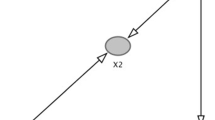Abstract
The fundamental unit of assessment in the sociobiology debate is neither a field nor a theory, but a framework of group commitments. Recourse to the framework concept is motivated, in general, by post-Kuhnian philosophy of scientific change and, in particular, by the dispute between E. O. Wilson and R. C. Lewontin. The framework concept is explicated in terms of commitments about problems, domain, disciplinary relations, exemplars, and performance evaluations. One upshot is that debate over such charges as genetic determinism, reductionism, adaptationism, and the biologization of human nature has been vexed. It has lost sight of human sociobiology's central problem, namely to help show that the modern synthesis is complete.
Similar content being viewed by others
References
Allen, E. et al.: 1976, ‘Sociobiology: Another Biological Determinism’, BioScience 26, 182–186.
Barash, D.: 1979, The Whisperings Within: Evolution and the Origin of Human Nature, Penguin, Dallas Tx.
Barlow, G.: 1980, ‘The Development of Sociobiology: A Biologist's Perspective’, in G. Barlow and J. Silverberg (eds.), Sociobiology: Beyond Nature-Nurture? Reports, Definitions, and Debate, Westview, Boulder, Co., pp. 1–24.
Bleier, R.: 1984, Science and Gender: A Critique of Biology and Its Theories on Women, Pergamon, New York.
Brandon, B.: 1985, ‘Phenotypic Platicity, Cultural Transmission, and Human Sociobiology’, in J. H. Fetzer (ed.), Sociobiology and Epistemology, D. Reidel, Dordrecht, pp. 57–74.
Brown, H.: 1977, Perception, Theory and Commitment, University of Chicago Press, Chicago, Ill.
Darden, L. and Maull, N.: 1977, ‘Interfield Theories’, Philosophy of Science 44, 43–64.
Doppelt, G.: 1978, ‘Kuhn's Epistemological Relativism: An Interpretation and Defense’, Inquiry 21, 453–72.
Doppelt, G.: 1983, ‘Recent Conceptions of Scientific Rationality’, in N. Rescher (ed.), Scientific Explanation and Understanding: Essays on Reasoning and Rationality in Science, University Press of America, Lanham, MD., pp. 106–142.
Fetzer, J. H. (ed.): 1985, Sociobiology and Epistemology, D. Reidel, Dordrecht.
Fetzer, J. H.: 1985a, ‘Science and Sociobiology’, in J. H. Fetzer (ed.), Sociobiology and Epistemology, D. Reidel, Dordrecht, pp. 217–248.
Kitcher, P.: 1985, Vaulting Ambition: Sociobiology and the Quest for Human Nature, The MIT Press, Cambridge, Mass.
Kuhn, T.: 1970, The Structure of Scientific Revolutions, University of Chicago Press, Chicago, Il.
Lakatos, I. and Musgrave, A. (eds.): 1970, Criticism and the Growth of Knowledge, Cambridge University Press, Cambridge, Mass.
Lakatos, I.: 1970a, ‘Falsification and the Methodology of Scientific Research Programmes’, in I. Lakatos and A. Musgrave (eds.), Criticism and the Growth of Knowledge, Cambridge University Press, Cambridge, Mass., pp. 91–196.
Lancaster, J.: 1984, ‘Evolutionary Perspectives on Sex Differences in the Higher Primates’, in A. S. Rossi (ed.), Gender and the Life Course, Aldine, Hawthorne, N.Y., pp. 3–27.
Laudan, L.: 1981, ‘A Problem-Solving Approach to Scientific Progress’, in I. Hacking, Scientific Revolutions, Oxford University Press, Oxford, N.Y.
Leacock, E.: 1980, ‘Social Behavior, Biology and the Double Standard’, in G. Barlow and J. Silverberg, Sociobiology: Beyond Nature-Nurture? Reports, Definitions, and Debate, Westview, Boulder, Co., pp. 465–488.
Leeds, A. and Dusek, V. (eds.): 1981–82, ‘Sociobiology: The Debate Evoles’, The Philosophical Forum 2–3, i-323.
Lewontin, R. C.: 1976: ‘Sociobiology: A Caricature of Darwinism’, in F. Suppe and P. Asquith (eds.), Proceedings of the Philosophy of Science Association 2, 22–31, Philosophy of Science Association, East Lansing, Mich.
Lewontin, R. C.: 1977, ‘Biological Determinism as a Social Weapon’, in Sociobiology Study Group of Boston, Biology as a Social Weapon, Burgess, Minneapolis, MA., pp. 6–17.
Lewontin, R. C.: 1977a, ‘Caricature of Darwinism’, Nature 266, 283–284.
Lewontin, R. C.: 1979, ‘Sociobiology as an Adaptationist Program’, Behavioral Science 24, 5–14.
Lewontin, R. C.: 1981, ‘Sleight of Hand’, The Sciences, July/August, 23–26.
Lumsden, C. J. and Wilson, E. O.: 1981, Genes, Mind and Culture, Harvard University Press, Cambridge, Mass.
Lumsden, C. J. and Gushurst, A. C.: 1985, ‘Gene-Culture Coevolution: Humankind in the Making’, in J. H. Fetzer (ed.), Sociobiology and Epistemology, D. Reidel, Dordrecht, pp. 3–30.
Masters, R. D.: 1985, ‘Evolutionary Biology, Human Nature, and Knowledge’, in J. H. Fetzer (ed.), Sociobiology and Epistemology, D. Reidel, Dordrecht, pp. 97–114.
Popper, K.: 1970, ‘Normal Science and its Dangers’, in I. Lakatos and A. Musgrave, Criticism and the Growth of Knowledge, Cambridge University Press, Cambridge, Mass., pp. 51–58.
Rosenberg, A.: 1985, ‘Adaptationalist Imperatives and Panglossian Paradigms’, in J. H. Fetzer (ed.), Sociobiology and Epistemology. D. Reidel, Dordrecht, 161–180.
Ruse, M.: 1979, Sociobiology: Sense or Nonsense?, D. Reidel, Dordrecht.
Segerstrale, U.: 1985, ‘Colleagues in Conflict: An ‘In Vivo’ Analysis of the Sociobiology Controversy’, Biology and Philosophy 1, 53–88.
Silverberg, J.: 1980, ‘Sociobiology, the New Synthesis? An Anthropologist's Perspective’, in G. Barlow and J. Silverberg, Sociobiology: Beyond Nature-Nurture? Reports, Definitions, and Debate, Westview, Boulder, Co., pp. 25–74.
Smith, J. W.: 1984, Reductionism and Cultural Being: A Philosophical Critique of Sociobiological Reductionism and Physicalist Scientific Unificationism, Martinus Nijhoff, Dordrecht.
Sober, E.: 1985, ‘Methodological Behaviorism, Evolution, and Game Theory’, in J. H. Fetzer (ed.), Sociobiology and Epistemology, D. Reidel, Dordrecht, pp. 181–200.
Thompson, P.: 1985, ‘Sociobiological Explanation and the Testability of Sociobiological Theory’, in J. H. Fetzer (ed.), Sociobiology and Epistemology, D. Reidel, Dordrecht, pp. 201–216.
Wilson, E. O.: 1975, Sociobiology: The New Synthesis, Harvard University Press, Cambridge, Mass.
Wilson, E. O.: 1976, ‘Academic Vigilantism and the Political Significance of Sociobiology’, BioScience 26, 183–190.
Wilson, E. O.: 1978, On Human Nature, Harvard University Press, Cambridge, Mass.
Wilson, E. O.: 1978a, ‘Foreword’, in A. Caplan, The Sociobiology Debate, Harper and Row, New York, N.Y.
Wilson, E. O.: 1980, ‘A Consideration of the Genetic Foundations of Human Social Behavior’, in G. Barlow and J. Silverberg (eds.), Sociobiology: Beyond Nature/Nurture?, Westview, Boulder, Co.
Author information
Authors and Affiliations
Rights and permissions
About this article
Cite this article
Holcomb, H.R. Criticism, commitment, and the growth of human sociobiology. Biol Philos 2, 43–63 (1987). https://doi.org/10.1007/BF00127564
Issue Date:
DOI: https://doi.org/10.1007/BF00127564



